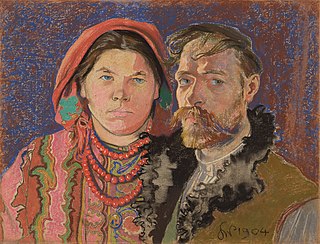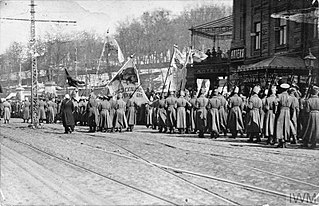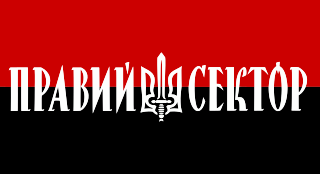 W
WUkrainian nationalism is the ideology promoting the unity of Ukrainians into their own nation state. Although the current Ukrainian state emerged fairly recently, some historians, such as Mykhailo Hrushevsky, Orest Subtelny, and Paul Robert Magocsi, cited the medieval state of Kyivan Rus as an early precedent of specifically Ukrainian statehood. The origins of modern Ukrainian nationalism are also traced to the 17th-century Cossack uprising against the Polish–Lithuanian Commonwealth led by Bohdan Khmelnytsky.
 W
WThe Brotherhood of Saints Cyril and Methodius was a short-lived secret political society that existed in Kiev, at the time a part of the Russian Empire.
 W
WChłopomania or Khlopomanstvo are historical and literary terms inspired by the Young Poland modernist movement and the Ukrainian Hromady. The expressions refer to the intelligentsia's fascination with, and interest in, the peasantry in late-19th-century Galicia and right-bank Ukraine.
 W
WThe Cyborgs are Ukrainian servicemen who participated in defense of Serhiy Prokofiev Donetsk Airport during the war in eastern Ukraine, including fighting around the Donetsk International Airport (DIAP) and participants in breakthroughs to help defenders. They were all volunteers.
 W
WDecommunization in Ukraine started after the collapse of the Soviet Union. It was formalized in April 2015, when the Ukrainian government approved laws that outlawed communist symbols.
 W
WThe Dybbuk. A Tale of Wandering Souls is a 2015 documentary film by Polish filmmaker and director Krzysztof Kopczyński. The film tells the story of a conflict between Orthodox Jews and Ukrainian far-right activists in Uman, a city in Ukraine, just before the 2013 Euromaidan protests.
 W
WEuromaidan was a wave of demonstrations and civil unrest in Ukraine, which began on the night of 21 November 2013 with public protests in Maidan Nezalezhnosti in Kyiv. The protests were sparked by the Ukrainian government's decision to suspend the signing of an association agreement with the European Union, instead choosing closer ties to Russia and the Eurasian Economic Union. The scope of the protests soon widened, with calls for the resignation of President Viktor Yanukovych and his government. The protests were fueled by the perception of "widespread government corruption", "abuse of power", and "violation of human rights in Ukraine". Transparency International named President Yanukovych as the top example of corruption in the world. The situation escalated after the violent dispersal of protesters on 30 November, leading to many more protesters joining. The protests led to the 2014 Ukrainian revolution.
 W
WFar-right politics in Ukraine refers to the actions, organizations, and beliefs of the far-right in Ukraine. In the recent years it has been closely related to an increased level of extreme far-right ideology promoting neo-nazism, white supremacy, antisemitism and xenophobia in Ukraine. There is a growing body of evidence of civil freedom violations, bans on books, violence of far-right extremists, ultranationalism, neo-Nazi pogroms of ethnic communities such as Roma people, attacks on feminists and LGBT minorities, and officially sponsored glorification of Nazi collaborators.
 W
WThe 2014 Maidan revolution, also known as the Revolution of Dignity, took place in Ukraine in February 2014 at the end of the Euromaidan protests, when a series of violent events involving protesters, riot police, and unknown shooters in the Ukrainian capital Kyiv culminated in the ousting of elected president Viktor Yanukovych, and the overthrow of the Ukrainian government.
 W
WFemen is a radical feminist activist group whose goal is to protect women's rights. The organization became internationally known for organizing controversial topless protests against sex tourism, religious institutions, sexism, homophobia, and other social, national, and international topics. Founded in Ukraine, the group is now based in France. Femen describes its ideology as being "sextremism, atheism and feminism".
 W
W"Glory to Ukraine" is a Ukrainian national salute. It appeared at the beginning of the 20th century in different variations, when it became wildly popular among ethnic Ukrainians during the Ukrainian War of Independence of 1917–1921.
 W
WGreater Ukraine refers to an irredentist concept of the territory claimed by some Ukrainian nationalist groups outside of Ukraine which are considered part of national homeland by Ukrainians, based on the present-day or historical presence of Ukrainian populations in those areas.
 W
WEastern Galicia was the heartland of the medieval Kingdom of Galicia–Volhynia, currently spread over the provinces of Lviv, Ivano-Frankivsk, and Ternopil in modern western Ukraine. Along with Poles and Ukrainians, Jews were one of the three largest ethnic groups in Eastern Galicia with almost 900,000 people by 1910. From the late 18th century until the early 20th century eastern Galicia had the largest concentration of Jews of any region in Europe.
 W
WPeople's Front is a nationalist and conservative political party in Ukraine founded by Arseniy Yatsenyuk and Oleksandr Turchynov in 2014.
 W
WThe Polubotok Club Affair was an important national civil affair and an armed revolt of the Kiev garrison troops that took place on July 17–18, 1917 in Kiev soon after the collapse of the Kerensky Offensive. It was part of a Ukrainian military movement, one of key roles played by the public organization Ukrainian Military Club of Pavlo Polubotok.
 W
WRevolution on Granite was a student protest campaign that took place in Kyiv, Ukraine, in October 1990. Ukraine was then the Ukrainian SSR, part of the Soviet Union until its declaration of independence from the Soviet Union on 24 August 1991. The protest was held from 2 October until 17 October 1990. One of the students' demands was the resignation of the Chairman of the Council of Ministers of the Ukrainian SSR Vitaliy Masol. On the last day of the protests Masol was forced to resign and was replaced by Vitold Fokin.
 W
WRight Sector is a right-wing to far-right Ukrainian nationalist political party and paramilitary movement. It originated in November 2013 as a paramilitary confederation of several radical nationalist organizations at the Euromaidan revolt in Kyiv, where its street fighters participated in clashes with riot police. The coalition became a political party on 22 March 2014, at which time it claimed to have roughly 10,000 members.
 W
WUkraine without Kuchma was a mass protest campaign that took place in Ukraine in 2000–2001, demanding the resignation of President Leonid Kuchma, and preceding the Orange Revolution. Unlike the Orange Revolution, Ukraine without Kuchma was effectively extinguished by the government enforcement units, and followed by numerous arrests of the opposition and the Ukrainian-speaking participants. Seeking the criminal responsibility for those events was renewed with the election of Viktor Yanukovych as the President of Ukraine.
 W
WThe West Ukrainian People's Republic (WUPR) or West Ukrainian National Republic (WUNR), known for part of its existence as the Western Oblast of the Ukrainian People's Republic, was a short-lived polity that controlled Eastern Galicia from November 1918 to July 1919. It included the cities of Lviv, Ternopil, Kolomyia, Drohobych, Boryslav, Stanislaviv and right-bank Przemyśl, and claimed parts of Bukovina and Carpathian Ruthenia. Politically, the Ukrainian National Democratic Party dominated the legislative assembly, guided by varying degrees of Greek Catholic, liberal and socialist ideology. Other parties represented included the Ukrainian Radical Party and the Christian Social Party.
 W
WUkrainization is a policy or practice of increasing the usage and facilitating the development of the Ukrainian language and promoting other elements of Ukrainian culture, in various spheres of public life such as education, publishing, government and religion. The term is also used to describe a process by which non-Ukrainians or Russified Ukrainians come to accept Ukrainian culture and language as their own.
 W
WUkrainophilia is the love of or identification with Ukraine and Ukrainians; its opposite is Ukrainophobia. The term is used primarily in a political and cultural context. "Ukrainophilia" and "Ukrainophile" are the terms used to denote pro-Ukrainian sentiments, usually in politics and literature. Ukrainophilia was severely persecuted by the imperial Russian government. Ukrainian-language books and theater were banned.